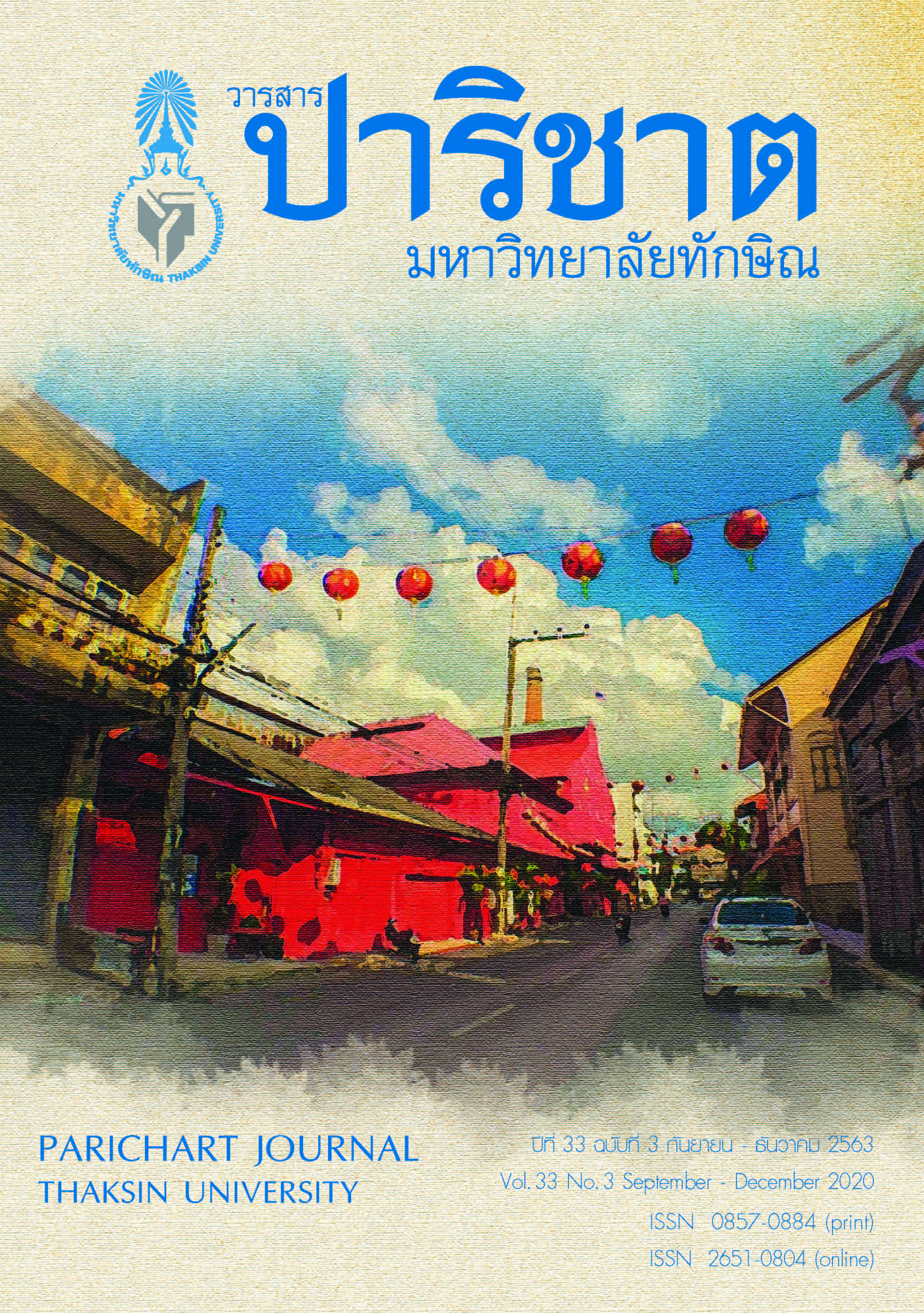Evaluation of Loans for Deferral Sales Project of Major Paddy Rice in Crop Year 2017/2018: Project Management Perspectives
Main Article Content
Abstract
This research article aimed 1) to evaluate contexts, inputs, processes, and outputs of the Loan Project for Deferral Sales of the Major Paddy Rice in Crop Year 2017/18, and 2) to propose project development guidelines that suit the Thai context. It employed a qualitative design to collect data from documents, non-participant observations, and in-depth interviews. Purposively selected, 31 key informants comprised 1) farmers, 2) agricultural cooperatives, 3) Bank for Agriculture and Agricultural Cooperatives, and 4) scholars. The obtained data were analyzed using inductive analysis. Findings revealed that 1) the evaluation results included: (1) contexts: since the rice farmers accumulated debts from rice-farming investment, they were forced to immediately cash out their rice harvests to repay these debts and cover daily expenses. Furthermore, their ways of life have changed, and hence, storing rice in barns for later sales was no longer practiced. Consequently, these actions influenced farmers and farmers’ institutions in every region on their participation in this project. (2) Inputs: despite human resources, financial budgets, materials, equipment, and venues being adequate, officials struggled with limited expertise in rice varieties, the lack of inspection equipment on rice quality, and no access to barns in some provinces. (3) Processes: operations were effectively
streamlined with modern management, but competitions were not sufficiently emphasized. (4) Outputs: the project helped to defer sales of paddy to markets as an attempt to relieve farmers’ cost burdens, and through it, they were able to sell the paddy with higher pricing. The project is only a factor among many as fewer farmers were found participating in than targeted, making results being less tangible. 2) The mainly proposed development guidelines were (1) issuance of measures to assist farmers with production factors, (2) increase of rice-storage fees for farmers, (3) state sponsorship of community rice dryers, and (4) barn pledges should separate ordinary rice from organic rice, and low-interest or interest-free loans should be subsidized for organic rice growers.
Article Details
References
The Thai Rice Foundation Under Royal Patronage. (2018). Rice policy and farmers. Retrieved October 5, 2018, from: http://www.thairice.org/doc_dl/convention-2559-policy-2.pdf. (In Thai)
Department of Foreign Trade. (2018). Information on rice production and trade. Retrieved October 7, 2018, from: http://www.thairiceinfo.go.th/?page=DataL3.ShowData&codeData=A1001. (In Thai)
Office of Small and Medium Enterprise Promotion. (2018). SME white paper 2018. Bangkok: Office of Small and Medium Enterprise Promotion. (In Thai)
Department of Foreign Trade. (2018). Rice production and export data. Retrieved October 7, 2018, from: http://www.thairiceinfo.go.th/?page=DataL3.ShowData&codeData=A1001. (In Thai)
Hunnak, C. (2017). Quality of life of Thai farmers: A case study of Suphanburi Province. Nakhonpathom: Collage of Innovation Management, Rajamangala University of Technology Rattanakosin. (In Thai)
Cooperative Promotion Department. (2018). Loan project to slow rice sales in 2017/2018. Retrieved on October 5, 2018, from: http://www.cpd.go.th/cpdth2560/index.php/component/k2/newscpd_project_to_slow_rice_2561_14oct2560. (In Thai)
Thai Rice Mills Association. (2019). Summary reports of rice price and paddy price. Retrieved on March 5, 2019, from: http://www.thairicemillers.org/images/1new.pdf. (In Thai)
Stufflebeam, D.L., & Shinkfield, A. J. (2007). Evaluation theory, models, and applications. California: Jossey-Bass Publishers.
Phongpaichit, P., & Christopher, J. B. (1995). Thailand, economy, and politics. Kuala Lumpur: Oxford University Press.
Chung, M. W. (1978). A model for evaluating the effects of Thai government taxation of rice exports on trade and welfare. American Journal of Agricultural Economics, 60(1), 65-73.
Rayasawath, C., & Laothamatas, A. (2015). Policy evaluation of tapioca pledge: A case study of the Northeast. Journal of Ratchaphruek, 13(2), 33-40. (In Thai)
Office of Agricultural Economics. (2017). The evaluation of the rice bank project in farmer institutions in 2017. Bangkok: Centre for Project and Programme Evaluation, Office of Agricultural Economics, Ministry of Agriculture and Cooperatives. (In Thai)
Attavanich, W. (2015). The impact evaluation of rice pledging scheme on the economic status of Thai farmers. Bangkok: The Thailand Research Fund (TRF). (In Thai)
Vedung, E. (2006). Evaluation research. In Peters, B. Guy and Pierre, Jon, eds. Handbook of Public Policy. London: Sage Publications.
Gordon, P. J. (1990). Rice policy of Japan’s LDP: Domestic trends toward agreement. Journal of Asian Survey, 30(10), 943-958.
Office of Agricultural Economics. (2017). Evaluation of the development of organic agriculture in 2017. Bangkok: Centre for Project and Programme Evaluation, Office of Agricultural Economics, Ministry of Agriculture and Cooperatives. (In Thai)


